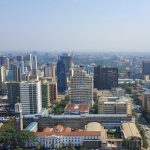TOP economists agree that Africa’s economic prospects for 2024 are positive, as small countries sparkle in the face of sluggish global growth projections.
Chief economists from the World Economic Forum, World Bank and United Nations project Africa’s economy will defy the impacts of weak investments, debt crises, inflation, tight financial conditions and extreme weather patterns to record an improvement over 2023.
A strong majority (65%) of World Economic Forum Chief Economists expect most of the continent to record at least moderate growth, according to the World Economic Forum Chief Economists Outlook 2024.
This comes against a background in which 56% of economists expect the global economy to weaken, due to a slowdown in manufacturing and services sectors this year, according to the WEF’s Outlook 2024. Africa and Latin America are bright spots in an otherwise gloomy outlook.
“Expectations for growth have strengthened in Latin America and the Caribbean and Sub-Saharan Africa, with a slight uptick in the share of respondents expecting at least moderate growth to 70% and 65%, respectively,” according to the outlook, released at the World Economic Forum Annual Meeting 2024 in Davos, Switzerland.
Respondents were less optimistic about North Africa than other parts of the continent, however, with only 46% of the economists polled expecting moderate growth in that region. Confidence in the region was dented by weaker oil demand and a sharp contraction in tourism.
More than half (56%) of economists expect moderate inflation for African countries this year, a big vote of confidence after heightened costs of living battered most African economies in 2022 and 2023.
Similar sentiments are shared by economic experts at the United Nations, with the UN World Economic Situation and Prospects (WESP) 2024 projecting that Africa’s economy will quicken slightly, with average GDP possibly inching up to 3.5% from 3.3% in 2023.
“A recovery in domestic demand is projected for those countries that experienced economic shocks stemming from currency depreciation, electricity shortages or armed conflict,”
Through a wider lens, World Bank Economists project a picture of economic resilience. While the global economy is set for the slowest half-decade of GDP growth in 30 years, African economies are projected to record slight upward growth compared to last year, and even when measured against the average growth of the previous decade.
Growth in Sub-Saharan African (SSA) is expected to accelerate to 3.8 % in 2024 and firm further to 4.1 % in 2025 as inflationary pressures fade and financial conditions ease, according to the Global Economic Prospects report.
Non-resource-rich smaller economies are punching above their weight with industrial commodity exporters seen driving up country growth and brightening up the continent’s overall prospects.
“While growth in the largest economies in SSA is expected to lag the rest of the region, non-resource-rich economies are forecast to maintain a growth rate above the regional average,” said World Bank Economists.
Niger (12.8%), Senegal (8.8%), and Rwanda (7.5%) will be among the world’s highest-growth economies in 2024, according to a World Bank report.
Other African countries expected to top the list of high-growth economies are the Democratic Republic of Congo (6.5%), Cote d’Ivoire (6.5%), Ethiopia (6.4%), Benin (6%), Uganda (6%), Guinea (5.8%), Guinea Bissau (5.6%), Tanzania (5.5%), and Liberia (5.4%).
“This uptick is due to the diminishing impact of the sharp fall in commodity prices from their 2022 peak. Growth in the non-mining sectors, especially services, is expected to pick up as inflation gradually declines,” said World Bank economists.
Excluding North Africa and three major economies – Nigeria, South Africa, and Angola, growth on the continent will accelerate from 3.9% in 2023 to 5% in 2024 and strengthen further to 5.3% in 2025.
Inflation and currency demonetization policy have been linked to weak economic growth in Nigeria, while an energy crisis in South Africa and lower oil production in Angola attributed to subdued prospects there.
In the north, growth is projected to rise above 2023 rates in Djibouti (5.1%), Morocco (3.1%), and Tunisia (3%), while Egypt (3.5%, down from 3.8%) will suffer from the adverse impact of conflicts in the Middle East.
Image Mockup: Hope Mukami













